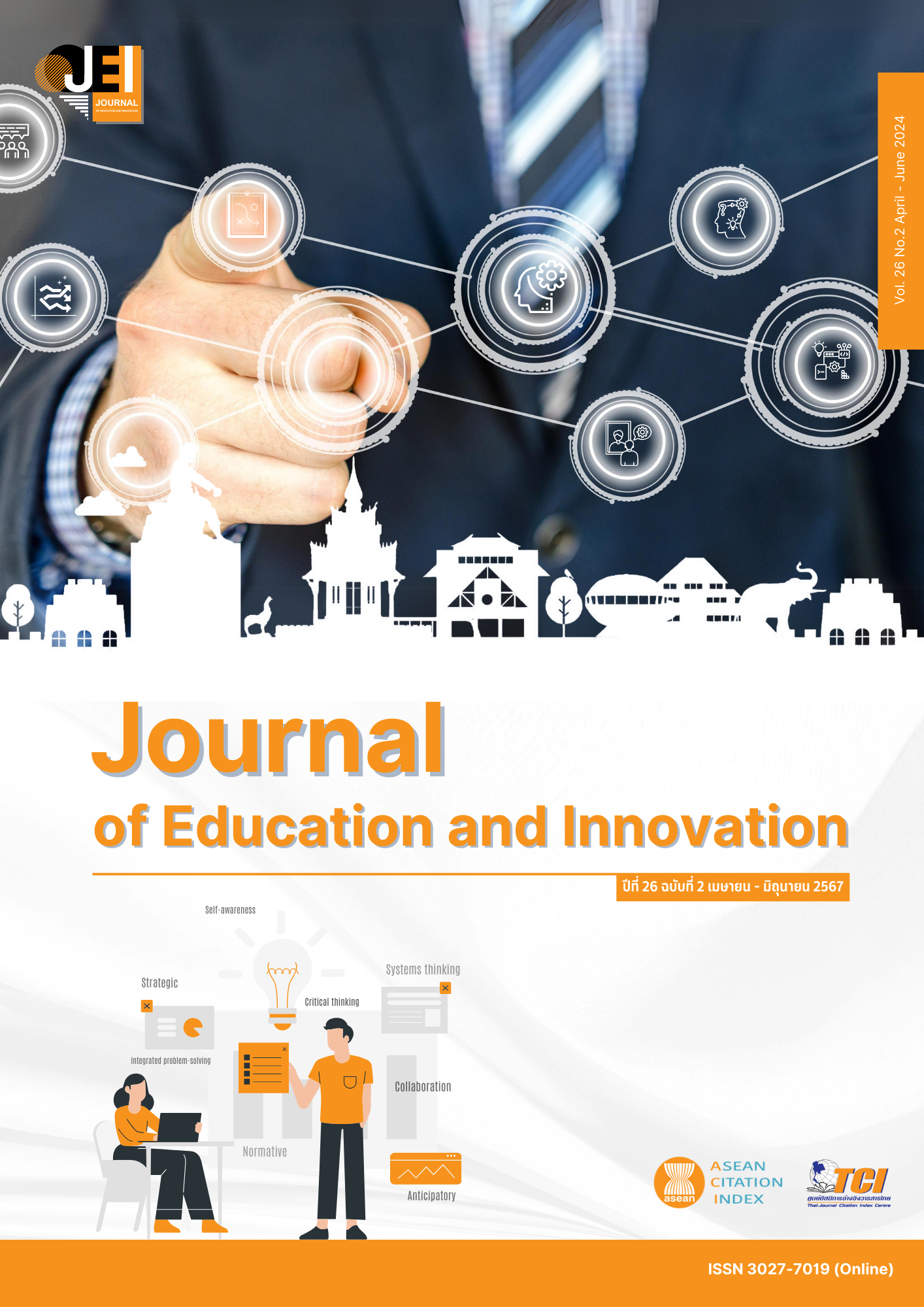THE DEVELOPMENT OF BOARD GAME TO ENHANCE AI AND PROGRAMMING SKILL FOR INDUSTRIAL STUDENTS
Main Article Content
Abstract
Programming is an important skill in the artificial intelligence era. Thus, the aim of this research is to design and develop a board game to enhance artificial intelligence and programming skills for industrial students. The study focused on evaluating AI and programming skills, learning achievement, and students’ opinions. The population consisted of 98 first- and second-year high diploma students majoring in electronics at Rajamangala University of Technology Isan, Khon Kaen Campus. The samples were a randomly sampled group of 31 first-year undergraduate students majoring in electronics from the same university. The research used a pre-test and post-test experimental design. The research tools included a board game, a board game quality assessment, an AI and programming skills assessment, a learning performance assessment, and a survey to collect students’ opinions regarding the board game. The results of the research indicated that the board game quality was rated as good ( = 4.20, S.D. = 0.42). The content aspect was at a good level (
= 4.33, S.D. = 0.51). Then, the media aspect was good level (
= 4.25, S.D. = 0.34). Then, the design aspect was at a good level (
= 4.20, S.D. = 0.42). The assessment of AI and programming skills revealed that the students were able to solve problems by decomposition, find patterns, and find the shortest or fastest route. The learning achievement after using the board game showed a significant improvement, with an average post-test score of 19.52 (S.D. = 3.69), indicating a significant difference from the pre-test scores at the 0.05 level of significance. The students’ opinion regarding the board game was highly satisfactory (
= 4.17, S.D. = 0.72). The content aspect was highly satisfactory (
= 4.12, S.D. = 0.71). Then, the media aspect was highly satisfactory (
= 4.19, S.D. = 0.72). Finally, the design aspect was highly satisfactory (
= 4.19, S.D. = 0.71).
Article Details

This work is licensed under a Creative Commons Attribution-NonCommercial-NoDerivatives 4.0 International License.
The owner of the article does not copy or violate any of its copyright. If any copyright infringement occurs or prosecution, in any case, the Editorial Board is not involved in all the rights to the owner of the article to be performed.
References
Bennedsen, J. (2008). Teaching and learning introductory programming: A model-based approach (Doctoral dissertation). Norway: University of Oslo.
Figueiredo, J., & García-Peñalvo, F. J. (2020). Increasing student motivation in computer programming with gamification. 2020 IEEE Global Engineering Education Conference (EDUCON). USA: IEEE.
Hunsaker, E. (2020). Computational thinking. In A. Ottenbreit-Leftwich, & R. Kimmons (Ed.), The K-12 educational technology handbook. Retrieved from https://edtechbooks.org/k12handbook
Iamjitkuson, P. (2021). Does AI technology affect employment, and how does employee adaptation? Retrieved from https://www.depa.or.th/th/article-view/ai-employment [in Thai]
Khongtanakunbawon, P., Jeekartok, K., Khongtanakunbawon, W., Phukongchana, P., & Sangsawang, N. (2023). The development of board game learning computing science in using technology safely for matthomyomsuksa 1. Journal of Humanities, Social Sciences, and Arts, 4(2), 1–9.
Keawmorakote, U., Noiying, P., & Koseeyaporn, P. (2020). Organizing blended learning for learning center subject: application of artificial intelligence in the industrial sector. Journal of Education and Innovation, 24(3), 326–337.
Maneehaet, S., & Wannapiroon, P. (2019). A digital learning ecosystem with artificial intelligence for smart learning. Journal of Education and Innovation, 21(2), 359–373.
Pandam, S. (2022). Upskilling and reskilling strategies to enhance vocational workforce in the era of disruptive technologies. The National Defense College of Thailand Journal, 63(1), 124-133. [in Thai]
Prainetr, S. (2023). Development of innovation instructional artificial intelligence for youth in provinces in special economic development zones Nakhon Phanom and Mukdahan. T-VET Journal, 7(13), 126–136.
Richey, R. C., & Klein, J. D. (2007). Design and Development Research: Methods, Strategies, and Issues. Routledge. https://doi.org/10.4324/9780203826034
Rowe, E., Asbell-Clarke, J., Gasca, S., & Cunningham, K. (2017). Assessing implicit computational thinking in zoombinis gameplay. The International Conference on the Foundations of Digital Games - FDG ’17. USA: Association for Computing Machinery.
Sittiwong, T. (2021). The effects of using board game to promote learning for undergraduate students Faculty of Education Naresuan University. Journal of Education and Innovation, 23(4), 187–200.
Srisa–Ard, B., (2002). Basic research (7th ed). Bangkok. Suweerivasarn.
Sudjitjoon, W., khodchapong, N., Treephongphan, U., Khongtan, K., & Hengpraprohm, S. (2022). The effectiveness of ai learning innovation for elementary school children. Journal of Buddhist Anthropology, 7(10), 327–338.
Tangpakdee, R. (2022). The The development of board games production model for education in Thailand. STOU Educational Journal, 15(2), 117-132.
Thammabut, T., Chueakun, P., Kaewthon, R., & Wonganu, P. (2022). The development of a board game to enhance computational thinking skill and motivation in computer programming course for undergraduate students. Journal of Information and Learning, 33(3), 34–45.
Waiyanet, W. (2022). Achievement with MIAP teaching method via board game on stack for diploma level. Journal of Industrial Education, 21(3), 24–33.
Wing, J. M. (2006). Computational thinking. Communications of the ACM, 49(3), 33-35.


